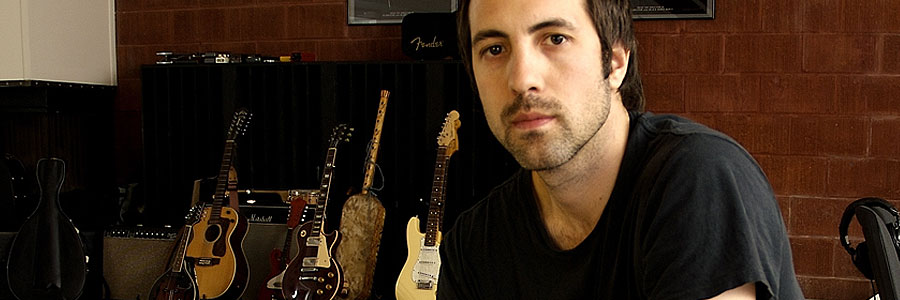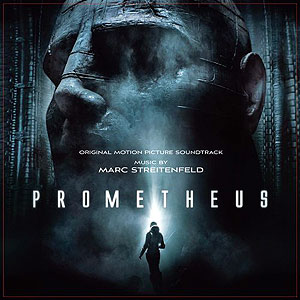On the very same day we were to see Prometheus at the IMAX, I met with the film’s composer, Marc Streitenfeld, at Sony’s London office, for an in-depth chat about all things music.
Streitenfeld, who was born and raised in Bavaria, Germany, moved to Los Angeles when he was 19 years old, where he took up an internship with composer Hans Zimmer. It was from there he caught the attention of director Ridley Scott and began working with him, first as a music supervisor and editor, and then composing for his films, starting with A Good Year in 2006.
They’ve now made 5 films together, including Prometheus, and I was keen to find out how this impressive score was written and recorded. It would prove to be an eventful day indeed!
What was it about film music that made you want to work in the industry?
“I really came to film music by chance. When I was growing up I was interested in all kinds of music; a lot of classical music, a lot of rock music as a teenager, and I played in bands. I came to film music at a later stage. I travelled to L.A. at 19 and I got my first job in the film industry and I started working for Hans Zimmer. That was my entry in the industry – and it happened to be film music. ”
Growing up in Germany, did you listen to much German music?
“Not much German contemporary music I have to say! I listened to classical German composers, I loved Beethoven and Bach, but in terms of popular music it was American and English music that really interested me. There were definitely some bands that I liked, but my first influences came from blues or English rock bands as a teenager. I was also interested in world music and music from different backgrounds. I like to expand my musical horizon once I know something I’m interested in, and also finding out the origin of something; how somebody else was influenced or what they listened to.”
What kind of a musical background did you have before you started interning with Hans Zimmer?
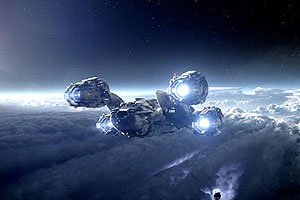
“I didn’t go to a music conservatory or a music school per say. I had lessons on classical guitar since I was a kid and I always played since I can remember – but no, I didn’t go to music school.”
What was the most valuable thing you took from that experience?
“It’s almost impossible for me to say – there were so many things happening at once and I was quite young…it just felt like a natural process to me. I think what was most valuable was that it didn’t feel like I was trying to learn something, or trying to accomplish something, it was a natural absorption process. I can’t say, but it was a great learning experience for sure.”
From there, that’s where you caught Ridley Scott’s attention?
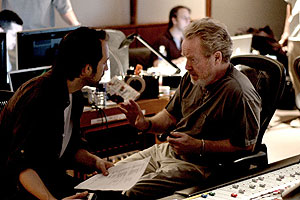
Yeah, I first started doing music editing for Ridley Scott and then one day, out of the blue, he asked me if I ever considered writing music myself, and I was pretty surprised. Then the next question was if I would be interested in scoring his next film, A Good Year. That was my start as a composer. ”
You’ve now done 5 films with him, what do you think makes a good working partnership like this between a director and a composer?
“In my case I feel communication with Ridley about music comes very easy to us and it’s very important. As a film composer, I always try to follow the director’s vision. I want to hear what the director wants to achieve with the music. Sometimes that’s hard to communicate because it’s not an easy language to speak. If you work together for a while, it becomes much easier, and also you develop a working partnership with somebody who speaks the same language as you, has the same instincts and the same aesthetics. That’s where I feel I really click well with Ridley. There are a lot of times we don’t have to talk about certain things because I can see from the visuals what he’s trying to achieve. Just by looking at the film I can understand where he’s going with certain things…and it definitely helps when you’ve worked with someone for a while. ”
How did Prometheus begin for you??
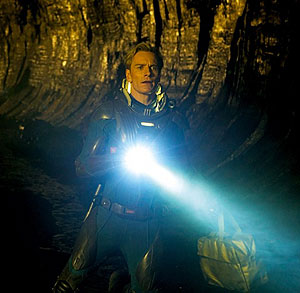
“Prometheus started, for me, with the script, which was kept very secret. I had to read it at the production office and I couldn’t leave the room with it. I read several drafts at the beginning and started writing ideas before Ridley even started shooting – which is odd – but I was really inspired right away. I was very excited, given that Alien was an amazing movie and that Ridley was going back to directing a sci-fi film, I was excited to be part of that. ”
From writing to finishing, how long was that process for Prometheus?
“It was quite a long process. I started writing the first ideas when I read the script and then Ridley went off to shoot the film and I completed another score in between. I finished a movie called The Grey before I started to actually really write Prometheus, so from the first ideas to completion it was probably a year. The scoring period was much shorter than that, it was condensed to a few months, still there’s a lot of music in the movie – it’s about over a hundred minutes I think. That takes a lot of time and preparation, even just the logicistics of the scoring, to get it all done on time.”
Is this as complete as the soundtrack gets or are there some notable omissions?
“Compared to my other soundtracks I think there’s a lot of music on this one, almost an hour, obviously there are some reductions. I always try to make a soundtrack stand out on its own in terms of a storytelling point of view so it’s not necessary to include all variations of everything – and 100 minutes first of all wouldn’t fit. You want to keep it exciting as a listening experience and create a length that’s the best for that. ”
Can you tell me a bit about the recording?
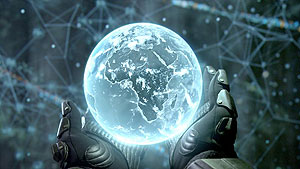
“I worked in London, at Abbey Road Studios with session players. It was a 90-piece orchestra with great and amazing players. To me, it’s always the most fun part of a project, to record with a great orchestra like that. It’s really great to hear the compositions played live for the first time. ”
They come in and play on sight don’t they?
“Yeah – it’s an amazing skill to have, there aren’t a lot of people who can do that. They walk in and it’s the first time they’ve seen it and they play it. Usually they have one rehearsal take but they’re spot on right from the start. ”
How long did you have with them?
“We recorded for… a little over a week. I split up some of the sessions because I wanted to do an initial session to try out some different sounds and techniques. I tried to do a few unusual approaches with this. I recorded some of the score backwards – but not in the sense that I just reversed the recording. I actually wrote out the sheet music backwards so the orchestra played it backwards and then I digitally flipped it. So you’re hearing the score as it’s written, the same melody, but with a backwards sounding orchestra which gives it a kind of unusual, unsettling sound.
I tried to do this with pretty much everything I recorded, not backwards, but tried to give it some unsettling elements. That obviously is a big undertaking and I wanted to first make sure this process works. I recorded some initial sound layers with the orchestra to have a vocabulary to establish a sound. I started doing that in the first sessions and then came back and recorded the full score. ”
That’s fascinating – as a kid I used to open up my cassettes, spool them inside out and put them back together so they would play backwards, so I was always fascinated with hearing sounds backwards, especially orchestral arrangements. Doing that with an orchestra…wow!
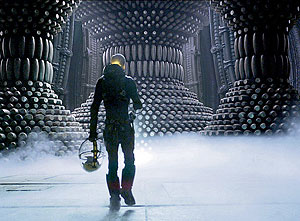
“It was quite challenging! After a while the players knew what it was, and I even tried to phrase things differently in a forward recording so when you flip it there’s a different expression and dynamic – the way I wanted it. It takes a while to get your head around to actually being able to comment on what they’re playing at the moment because it’s going to be in a different position, it’s going to be at the beginning of a note and not at the ending. If you decrescendo the note more extremely you accentuate the effect, so after a while you get into a rhythm of knowing how to work with it. I wanted to do everything I could to make the sound unusual. Ridley really liked those sounds. A lot of it was also with flutes, we first started doing it with woodwinds and it was just an interesting sound. ”
What have you done since finishing Prometheus and what’s next for you?
“I just finished up another film and it just went to Cannes. It’s called Killing Me Softly and I contributed some piano pieces and some unusual soundscapes to this film. It has a very interesting musical approach that Andrew Dominik, the director, took. It almost has a kind of David Lynch approach, with strange sounds that we played around with. That was fun to do. Then I’ll take a little break I hope, it’s been a long stretch; finishing this film and doing two films back to back, so I’m looking forward to that.”
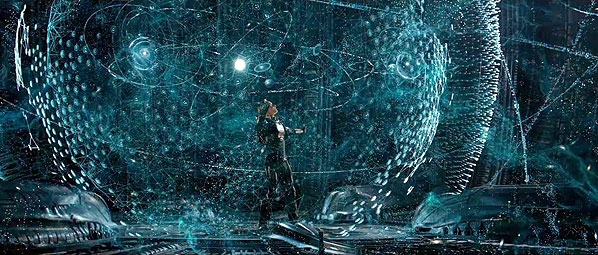

Patrick Samuel
The founder of Static Mass Emporium and one of its Editors in Chief is an emerging artist with a philosophy degree, working primarily with pastels and graphite pencils, but he also enjoys experimenting with water colours, acrylics, glass and oil paints.
Being on the autistic spectrum with Asperger’s Syndrome, he is stimulated by bold, contrasting colours, intricate details, multiple textures, and varying shades of light and dark. Patrick's work extends to sound and video, and when not drawing or painting, he can be found working on projects he shares online with his followers.
Patrick returned to drawing and painting after a prolonged break in December 2016 as part of his daily art therapy, and is now making the transition to being a full-time artist. As a spokesperson for autism awareness, he also gives talks and presentations on the benefits of creative therapy.
Static Mass is where he lives his passion for film and writing about it. A fan of film classics, documentaries and science fiction, Patrick prefers films with an impeccable way of storytelling that reflect on the human condition.
Patrick Samuel ¦ Asperger Artist
